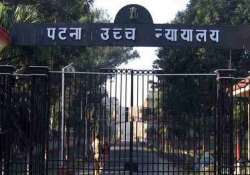Patna: With an impressive 179 fast-track courts functional as of the last month, Bihar continues to be the top state in the country in terms of justice delivery.
Other states like Maharashtra, Madhya Pradesh, UP, West Bengal, Andhra Pradesh and Gujarat also have high number of operational fast track courts.
In the coming five years, the government has also proposed to set up 460 family courts in districts without such courts and with a population of 1 million or more.
The Centre has also planned to set up 1,800 fast track courts (FTCs) to speed up the process of justice delivery esp. in cases of heinous crimes, cases involving senior citizens, women, children, disabled and disputes involving land acquisition and property, which are in the dock for over five years.
These projects will be receiving funds through the recommendations of the 14th Finance Commission.
Earlier in the year 2000, the central government had financially assisted the states for setting up as many as 1,734 fast track courts.
The central grant was allotted for a fixed time period of five years but was later extended till 2011. Some of the states such as Bihar, Himachal and Maharashtra have continued FTCs with their own resources.
After the Nirbhaya gangrape incident of December 2012 in Delhi, states and chief justices had decided to set up additional FTCs relating to offences against women, children differently-abled persons and senior citizens and marginalized sections of society.
The law ministry had also resolved to grant funds up to Rs 80 crore per annum on a matching basis from states till March 2015. However, the Centre also cleared that this grant money will be used only for the purpose of meeting salaries of judges required for running these FTCs.
According to a status report of the law ministry, 212 FTCs have been set up so far for the purpose of fast tracking cases against women and children in 16 states.
However, an opinion was expressed against encouraging FTCs, during a recent meeting of the advisory council of the National Mission for Justice Delivery and Legal Reforms, chaired by law minister Sadananda Gowda in January.
A view was expressed that fast tracking certain categories of cases results in slow tracking other categories. Law commission chairman Justice A P Shah had suggested that a more holistic approach be adopted for pendency reduction.
Latest India News
